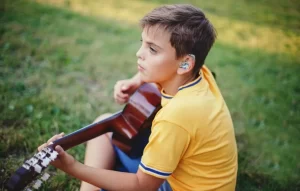
Are you worrying that your child may be struggling with hearing loss? If they are too young to understand or articulate what they are going through, it is important for you as a parent to understand the signs of hearing problems or delays. A hearing impairment, if not addressed early on, can have a negative impact on cognitive, social, and emotional development. It may also delay speech. Early and regular screenings can combat any developmental delays.
Causes
Hearing loss in children isn’t uncommon. In fact, it impacts as many as 1-3 out of 1,000 babies. The birth defect can be caused by a slew of factors, but many times doctors are unable to determine the cause. Some common causes of hearing loss among newborns include:
- Premature birth
- Newborn jaundice
- Certain medications
- A family history of childhood hearing loss
- Complications at birth
- Trauma
Children who have frequent hearing infections, who had meningitis as a child, or were exposed to dangerous noise levels may also experience hearing loss.
When to Screen
Hearing should be screened before your newborn leaves the hospital or within the first three weeks of life. This screening should detect any hearing loss, but studies show that the rates of hearing loss between birth and the teen years doubles. That means it’s especially important for children to have regular hearing tests as they grow. If any hearing loss is detected, treating it before the child reaches six months old proves to be most effective. If the child doesn’t have any signs of hearing loss, they can be tested annually beginning at age four.
Different kinds of tests are required during pediatric screenings versus adult ones because children simply cannot articulate issues like adults can. Tests may be performed while the child is asleep. Other tests require the child to move a toy when they hear a noise or they are visually encouraged to respond to sound stimuli. None of the tests are painful for the child.
Signs of Hearing Loss
Despite your child passing hearing tests, it’s important to monitor them for any signs of hearing loss. By the time your baby turns one, they should begin to recognize their parents’ voices and turn their heads when they hear sounds. Loud sounds should startle them, and they should be able to imitate some sounds they frequently hear (ex. mama and dada). If, as a toddler, your child doesn’t speak much, is struggling to learn, or frequently seems to be unfocused, hearing loss may be the cause. They may also need to listen to the television louder than is considered a normal listening volume or loud background noise may frustrate them. They may even struggle in one-on-one conversations.
There are several types of hearing loss, including sensorineural, conductive, mixed, and central. Children may also experience auditory process disorder (APD), in which the brain and ears do not coordinate as well as they should. Several different tests can determine if your child is struggling with any of these types of hearing loss.
To schedule a hearing test for your child, visit us today.